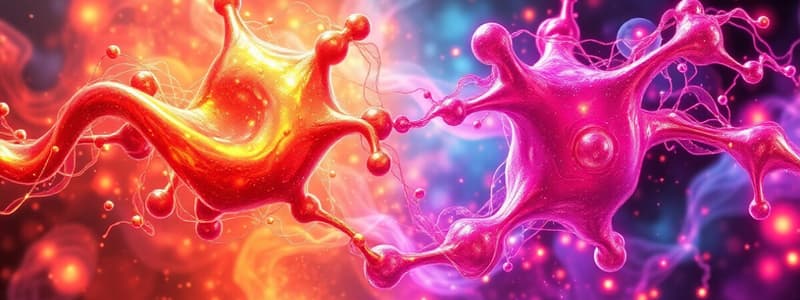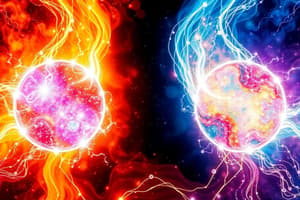Podcast
Questions and Answers
What is the charge of the Carbon atom in CO₃²⁻?
What is the charge of the Carbon atom in CO₃²⁻?
- 2
- 4 (correct)
- -4
- 0
In the reaction 2Fe (s) + O₂ (g) → 2FeO, which element undergoes oxidation?
In the reaction 2Fe (s) + O₂ (g) → 2FeO, which element undergoes oxidation?
- 2 (correct)
- 4
- 0
- 2 (correct)
What is the oxidation state of Oxygen in SO₄²⁻, excluding H₂O₂?
What is the oxidation state of Oxygen in SO₄²⁻, excluding H₂O₂?
- -1
- -2 (correct)
- 0
- 2
Which of the following ions has a +2 charge?
Which of the following ions has a +2 charge?
Which element acts as a reducing agent in the reaction involving Cr and HCl?
Which element acts as a reducing agent in the reaction involving Cr and HCl?
What is the charge of hydrogen when it is in a compound?
What is the charge of hydrogen when it is in a compound?
What is the oxidation state of oxygen in H2O2?
What is the oxidation state of oxygen in H2O2?
What is the total charge in water (H2O)?
What is the total charge in water (H2O)?
Determine the oxidation state of manganese in KMnO4.
Determine the oxidation state of manganese in KMnO4.
What is the charge of sulfur in a sulfate ion (SO4)?
What is the charge of sulfur in a sulfate ion (SO4)?
What charge does the nitrogen atom have in the nitrate ion (NO3)?
What charge does the nitrogen atom have in the nitrate ion (NO3)?
In a compound, what is the charge of calcium (Ca)?
In a compound, what is the charge of calcium (Ca)?
What is the charge of chlorine when it is found in a compound?
What is the charge of chlorine when it is found in a compound?
Flashcards
Oxidation State
Oxidation State
The overall charge of an atom in a compound. It represents the number of electrons gained or lost by the atom to achieve stability.
Redox Reaction
Redox Reaction
A chemical reaction where electrons are transferred between reactants, resulting in changes in the oxidation states of the involved atoms.
Oxidation
Oxidation
The process of losing electrons, increasing the oxidation state of an atom.
Reduction
Reduction
Signup and view all the flashcards
Oxidizing Agent
Oxidizing Agent
Signup and view all the flashcards
Reducing Agent
Reducing Agent
Signup and view all the flashcards
Oxidation (Broader Definition)
Oxidation (Broader Definition)
Signup and view all the flashcards
Reduction (Broader Definition)
Reduction (Broader Definition)
Signup and view all the flashcards
Study Notes
Redox (Reduction-Oxidation) Reactions
- Redox reactions involve electron transfer between reactants.
- Oxidation is the loss of electrons, and reduction is the gain of electrons.
- Oxidizing agents gain electrons (undergo reduction).
- Reducing agents lose electrons (undergo oxidation).
- Oxidation number/charges represent the number of electrons gained or lost.
Important Charges to Memorize
- Elements in their standard (natural) state have a charge of 0
- H (hydrogen), Li, Na, K have a charge of +1
- O (oxygen), S (sulfur), SO4 have a charge of -2 (except H₂O₂ where oxygen has a charge of -1)
- NO₃, F, Cl, Br, I have a charge of -1
- Ca, Mg, Zn have a charge of +2
- Fe has a charge of +2 or +3.
Examples
- In H₂O, hydrogen (H) has a +1 charge and oxygen (O) has a -2 charge.
- The total charge of the water molecule adds up to 0.
- In CO₂, carbon (C) has a +4 charge and oxygen (O) has a -2 charge, and the total charge is zero.
- In KMnO₄, the charge of K is +1, Mn is +7, and O is -2.
- The total charge adds up to zero.
Investigating Redox Reactions
-
Consider the reaction 2Fe(s) + O₂(g) → 2FeO
-
The oxidation states/charges of Fe and O are investigated to determine the reduction/oxidation of each.
-
During this reaction Fe is oxidized and O is reduced.
-
O is the oxidizing agent in this reaction, and Fe is the reducing agent.
-
Explore the reaction Cr(s) + 2HCl(aq) → CrCl₂(aq) + H₂(g).
-
Determine the oxidation states to identify what is oxidised, what is reduced, the oxidizing agent and reducing agent.
-
Cr is the reducing agent and H is the oxidizing agent in this reaction.
-
In the reaction MnO₂(s) + 4HCl(aq) → MnCl₂(aq) + Cl₂(g) + 2H₂O, establish the reduction and oxidation for each component.
-
Mn is the oxidizing agent, Cl is the reducing agent in this reaction.
Studying That Suits You
Use AI to generate personalized quizzes and flashcards to suit your learning preferences.




